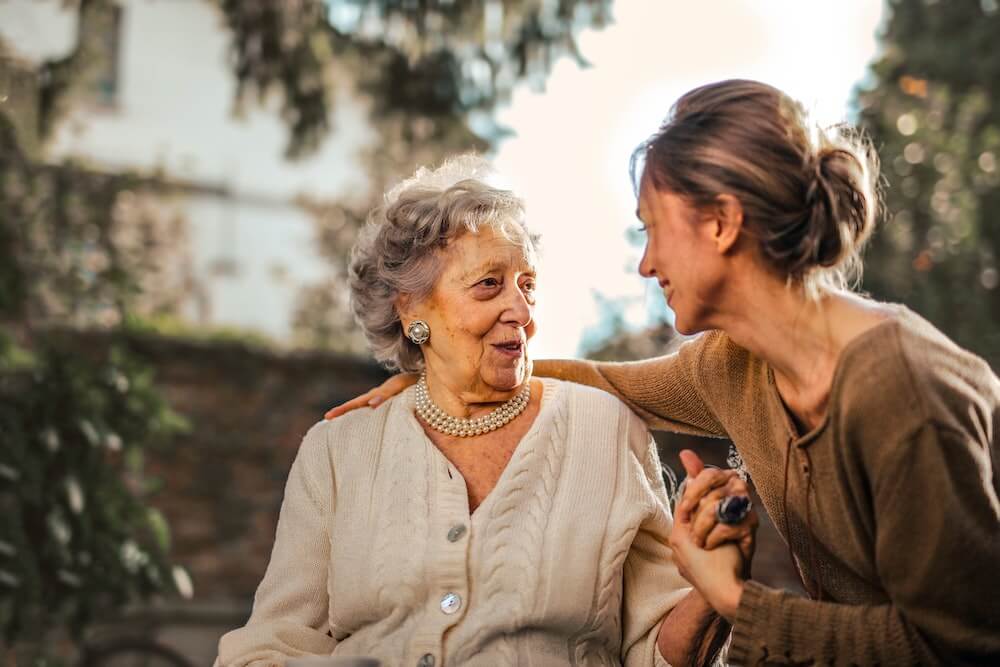Table of contents
‘Tis the season for spending time with loved ones! In addition to enjoying family traditions and time together, these holiday visits are a great time to check in on the health, wellbeing and safety of aging loved ones still living at home. Use the list below as a guide during your holiday visits to consider what additional support may be in your loved one’s best interest to keep them happy, healthy, and independent.
As you make note of any changes and needs, pay attention to your own wellbeing as well. “The holidays can prompt a litany of emotions in caregivers and family members,” explains Lauren Petry, Nurse Practitioner. “Remember, there is no right way to feel, and all of your feelings are valid."
What to Watch For:
Unintended Weight Changes
Gaining or losing weight can be a sign of a serious issue, such as depression, dementia, or cancer. It might also be caused by an unhealthy diet. Your loved one may lack the energy to cook nutritious and well-balanced meals. Medical conditions like arthritis or vision loss can limit an older adult’s ability to grocery shop and prepare meals. This can lead to poor nutrition and even malnutrition.
Unsteady Walk
Falls are a leading cause of injury among older adults, but most falls are preventable. Everything from poor nutrition to medication side effects can make an older adult unsteady on their feet. During your visit, pay close attention to how well your loved one moves, both through the house and when you are out and about in the community. In addition to their gait, consider the following:
- Do they appear to intentionally avoid going up or down even a few stairs?
- Do they seem to be more sedentary than usual?
- Are there bumps and bruises on their arms and legs?
- Do they stumble and hold on to furniture for balance?
- Do they verbalize feeling dizzy when standing up from a chair?
- If their medical provider has recommended using a cane or walker, is their chosen assistive device compliant with industry standards?
Change in Lifestyle
Ask your loved one how their friends are doing, especially those you personally know. Inquire about hobbies and volunteer work they’ve been involved with and which bring them joy. Does it seem as if they’ve dropped out of favorite activities or lost contact with friends? Isolated seniors are at much higher risk for health conditions, ranging from depression to heart disease and diabetes. Seek to find out why they’ve changed long-standing habits.
Personal Hygiene
Noting changes in your loved one’s personal hygiene can help give a medical provider a fuller picture of their overall wellbeing. Was your dad always known for his cologne and has stopped wearing it? Was your mother known to do her hair and makeup daily and has since stopped? Have you noticed your loved one wears the same outfit four days in a row? If your loved one refuses to shower or is opting for comfy, mismatched clothing, don’t force them to do otherwise for now. Make note of changes in their independence and ability to care for themselves. Meanwhile, don’t embarrass or shame them for making fashion choices that make them comfortable.
Condition of the Home
Maintaining a home is a lot of work at any age. For seniors, it can grow increasingly difficult. Early signs that something is amiss includes piles of unopened mail on the counter, clutter, overflowing trash cans, dirty dishes, expired food in the refrigerator, dying plants, and broken appliances not being repaired. Another sign of trouble is burned cookware, which might indicate that your loved one is forgetting they have something cooking on the stove—a dangerous fire hazard. Keep in mind, it is not the aesthetic of the home that is of concern, but their safety and noticing significant changes.
Medication Compliance
If your loved one is taking prescription medication, it can become increasingly difficult for them to manage this process. Are there prescription bottles that are empty and have not been refilled or are prescription bottles full that shouldn’t be? These are signs that your loved one may be struggling with properly managing their medication. If you notice that they are not taking their medication as prescribed, it’s something you will want to discuss.
You Noticed Changes. Now What?
If you notice any of these signs during your next visit, it may be time to consider what options and resources are available to support your loved one. It may also be helpful to bring up these concerns with your loved one’s physician or primary care provider. And if they reside in a senior living community served by EmpowerMe Wellness, our team is always available to help you consider how to proceed.
Choose your time to discuss these issues wisely, especially at this time of the year. While extremely important, these conversations can be difficult to initiate and navigate with your loved one, and emotions can run high for people of all ages during the holiday season. Unless you feel the situation is urgent and time sensitive, plan to initiate the conversation when there is time and space for you and your loved one to really hear each other. That way, you can move forward with patience and grace for all involved.



